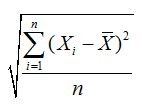In psychotherapy studies, an attention placebo control group is one in which comparable time or attention to the active treatment group is provided without:
a. a therapeutic relationship. c. specific interventions.
b. any of psychotherapy's common factors. d. producing the Hawthorne effect.
A
You might also like to view...
The formula below may be used to calculate what statistical value?

a. The variance of the data
b. The standard deviation of the data
c. The semi-inter quartile range of the data
d. The squared deviation of the mean
Answer the following statement(s) true (T) or false (F)
1. When the ACA Code of Ethics was revised in 2005, a new ethical mandate related to scientific bases for interventions was added. 2. Some counselors feel that a scientifically based intervention does not allow for creativity with clients. 3. For empirically based interventions, there is substantiated research to support their effectiveness. 4. Competence refers to an attribute held by the counselor, not the treatment method. 5. One of the biggest challenges to competence is impairment.
Answer the following statement(s) true (T) or false (F)
1. Reading and understanding the results section is probably the most daunting part of evaluating a research article for those who are somewhat intimidated by research and the use of math and statistics. 2. Those who are conducting and writing these sophisticated research articles typically have extensive backgrounds in statistics or employ a consultant who has considerable expertise with statistics. 3. There are entire graduate level courses in statistical procedures such as analyses of variance, regression, structural equation modeling, and nonparametric statistics and so on. 4. Results obtained through qualitative research methods are presented mathematically. 5. An important question to address when reading the results section is whether any violations of assumptions were made.
Which of the following is NOT an advantage of the unstructured interview?
a. It assures all topics are adequately discussed. b. It creates an atmosphere that is conducive to rapport building. c. It allows the client to feel as if he or she is directing the interview thus allowing the client to discuss items that he or she deems important. d. It offers the potential for greater depth of information and the uncovering of underlying issues that the client might otherwise avoid revealing.